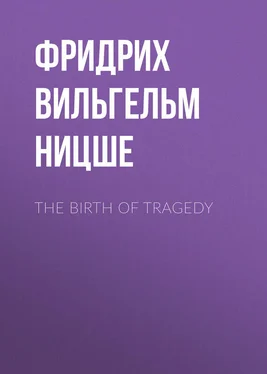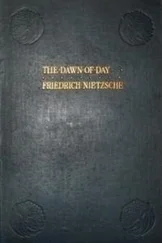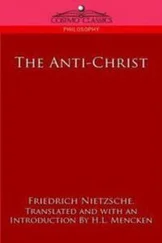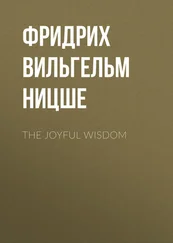Фридрих Ницше - The Birth of Tragedy
Здесь есть возможность читать онлайн «Фридрих Ницше - The Birth of Tragedy» — ознакомительный отрывок электронной книги совершенно бесплатно, а после прочтения отрывка купить полную версию. В некоторых случаях можно слушать аудио, скачать через торрент в формате fb2 и присутствует краткое содержание. Жанр: Философия, literature_19, foreign_antique, foreign_prose, на английском языке. Описание произведения, (предисловие) а так же отзывы посетителей доступны на портале библиотеки ЛибКат.
- Название:The Birth of Tragedy
- Автор:
- Жанр:
- Год:неизвестен
- ISBN:нет данных
- Рейтинг книги:3 / 5. Голосов: 1
-
Избранное:Добавить в избранное
- Отзывы:
-
Ваша оценка:
- 60
- 1
- 2
- 3
- 4
- 5
The Birth of Tragedy: краткое содержание, описание и аннотация
Предлагаем к чтению аннотацию, описание, краткое содержание или предисловие (зависит от того, что написал сам автор книги «The Birth of Tragedy»). Если вы не нашли необходимую информацию о книге — напишите в комментариях, мы постараемся отыскать её.
The Birth of Tragedy — читать онлайн ознакомительный отрывок
Ниже представлен текст книги, разбитый по страницам. Система сохранения места последней прочитанной страницы, позволяет с удобством читать онлайн бесплатно книгу «The Birth of Tragedy», без необходимости каждый раз заново искать на чём Вы остановились. Поставьте закладку, и сможете в любой момент перейти на страницу, на которой закончили чтение.
Интервал:
Закладка:
This cheerful acquiescence in the dream-experience has likewise been embodied by the Greeks in their Apollo: for Apollo, as the god of all shaping energies, is also the soothsaying god. He, who (as the etymology of the name indicates) is the "shining one," the deity of light, also rules over the fair appearance of the inner world of fantasies. The higher truth, the perfection of these states in contrast to the only partially intelligible everyday world, ay, the deep consciousness of nature, healing and helping in sleep and dream, is at the same time the symbolical analogue of the faculty of soothsaying and, in general, of the arts, through which life is made possible and worth living. But also that delicate line, which the dream-picture must not overstep – lest it act pathologically (in which case appearance, being reality pure and simple, would impose upon us) – must not be wanting in the picture of Apollo: that measured limitation, that freedom from the wilder emotions, that philosophical calmness of the sculptor-god. His eye must be "sunlike," according to his origin; even when it is angry and looks displeased, the sacredness of his beauteous appearance is still there. And so we might apply to Apollo, in an eccentric sense, what Schopenhauer says of the man wrapt in the veil of Mâyâ 4 4 Cf. World and Will as Idea, 1. 455 ff., trans, by Haldane and Kemp.
: Welt als Wille und Vorstellung, I. p. 416: "Just as in a stormy sea, unbounded in every direction, rising and falling with howling mountainous waves, a sailor sits in a boat and trusts in his frail barque: so in the midst of a world of sorrows the individual sits quietly supported by and trusting in his principium individuationis ." Indeed, we might say of Apollo, that in him the unshaken faith in this principium and the quiet sitting of the man wrapt therein have received their sublimest expression; and we might even designate Apollo as the glorious divine image of the principium individuationis, from out of the gestures and looks of which all the joy and wisdom of "appearance," together with its beauty, speak to us.
In the same work Schopenhauer has described to us the stupendous awe which seizes upon man, when of a sudden he is at a loss to account for the cognitive forms of a phenomenon, in that the principle of reason, in some one of its manifestations, seems to admit of an exception. Add to this awe the blissful ecstasy which rises from the innermost depths of man, ay, of nature, at this same collapse of the principium individuationis, and we shall gain an insight into the being of the Dionysian, which is brought within closest ken perhaps by the analogy of drunkenness. It is either under the influence of the narcotic draught, of which the hymns of all primitive men and peoples tell us, or by the powerful approach of spring penetrating all nature with joy, that those Dionysian emotions awake, in the augmentation of which the subjective vanishes to complete self-forgetfulness. So also in the German Middle Ages singing and dancing crowds, ever increasing in number, were borne from place to place under this same Dionysian power. In these St. John's and St. Vitus's dancers we again perceive the Bacchic choruses of the Greeks, with their previous history in Asia Minor, as far back as Babylon and the orgiastic Sacæa. There are some, who, from lack of experience or obtuseness, will turn away from such phenomena as "folk-diseases" with a smile of contempt or pity prompted by the consciousness of their own health: of course, the poor wretches do not divine what a cadaverous-looking and ghastly aspect this very "health" of theirs presents when the glowing life of the Dionysian revellers rushes past them.
Under the charm of the Dionysian not only is the covenant between man and man again established, but also estranged, hostile or subjugated nature again celebrates her reconciliation with her lost son, man. Of her own accord earth proffers her gifts, and peacefully the beasts of prey approach from the desert and the rocks. The chariot of Dionysus is bedecked with flowers and garlands: panthers and tigers pass beneath his yoke. Change Beethoven's "jubilee-song" into a painting, and, if your imagination be equal to the occasion when the awestruck millions sink into the dust, you will then be able to approach the Dionysian. Now is the slave a free man, now all the stubborn, hostile barriers, which necessity, caprice, or "shameless fashion" has set up between man and man, are broken down. Now, at the evangel of cosmic harmony, each one feels himself not only united, reconciled, blended with his neighbour, but as one with him, as if the veil of Mâyâ has been torn and were now merely fluttering in tatters before the mysterious Primordial Unity. In song and in dance man exhibits himself as a member of a higher community, he has forgotten how to walk and speak, and is on the point of taking a dancing flight into the air. His gestures bespeak enchantment. Even as the animals now talk, and as the earth yields milk and honey, so also something super-natural sounds forth from him: he feels himself a god, he himself now walks about enchanted and elated even as the gods whom he saw walking about in his dreams. Man is no longer an artist, he has become a work of art: the artistic power of all nature here reveals itself in the tremors of drunkenness to the highest gratification of the Primordial Unity. The noblest clay, the costliest marble, namely man, is here kneaded and cut, and the chisel strokes of the Dionysian world-artist are accompanied with the cry of the Eleusinian mysteries: "Ihr stürzt nieder, Millionen? Ahnest du den Schöpfer, Welt?" 5 5 Te bow in the dust, oh millions? Thy maker, mortal, dost divine? Cf. Schiller's "Hymn to Joy"; and Beethoven, Ninth Symphony. – TR.
Thus far we have considered the Apollonian and his antithesis, the Dionysian, as artistic powers, which burst forth from nature herself, without the mediation of the human artist, and in which her art-impulses are satisfied in the most immediate and direct way: first, as the pictorial world of dreams, the perfection of which has no connection whatever with the intellectual height or artistic culture of the unit man, and again, as drunken reality, which likewise does not heed the unit man, but even seeks to destroy the individual and redeem him by a mystic feeling of Oneness. Anent these immediate art-states of nature every artist is either an "imitator," to wit, either an Apollonian, an artist in dreams, or a Dionysian, an artist in ecstasies, or finally – as for instance in Greek tragedy – an artist in both dreams and ecstasies: so we may perhaps picture him, as in his Dionysian drunkenness and mystical self-abnegation, lonesome and apart from the revelling choruses, he sinks down, and how now, through Apollonian dream-inspiration, his own state, i. e. , his oneness with the primal source of the universe, reveals itself to him in a symbolical dream-picture .
After these general premisings and contrastings, let us now approach the Greeks in order to learn in what degree and to what height these art-impulses of nature were developed in them: whereby we shall be enabled to understand and appreciate more deeply the relation of the Greek artist to his archetypes, or, according to the Aristotelian expression, "the imitation of nature." In spite of all the dream-literature and the numerous dream-anecdotes of the Greeks, we can speak only conjecturally, though with a fair degree of certainty, of their dreams. Considering the incredibly precise and unerring plastic power of their eyes, as also their manifest and sincere delight in colours, we can hardly refrain (to the shame of every one born later) from assuming for their very dreams a logical causality of lines and contours, colours and groups, a sequence of scenes resembling their best reliefs, the perfection of which would certainly justify us, if a comparison were possible, in designating the dreaming Greeks as Homers and Homer as a dreaming Greek: in a deeper sense than when modern man, in respect to his dreams, ventures to compare himself with Shakespeare.
Читать дальшеИнтервал:
Закладка:
Похожие книги на «The Birth of Tragedy»
Представляем Вашему вниманию похожие книги на «The Birth of Tragedy» списком для выбора. Мы отобрали схожую по названию и смыслу литературу в надежде предоставить читателям больше вариантов отыскать новые, интересные, ещё непрочитанные произведения.
Обсуждение, отзывы о книге «The Birth of Tragedy» и просто собственные мнения читателей. Оставьте ваши комментарии, напишите, что Вы думаете о произведении, его смысле или главных героях. Укажите что конкретно понравилось, а что нет, и почему Вы так считаете.












